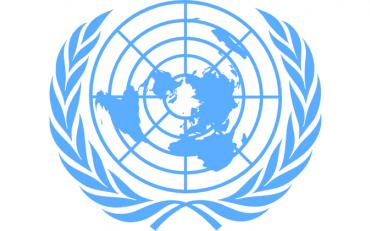- Back to IDPD page
- Download the Concept note in Word and PDF
- More information on IDA's work on the Article 11 Project
Date: 3 December 2018
Time: 3:00 PM
Venue: Trusteeship Council Chamber, United Nations Headquarters, New York
Participation: All UN Member States, Permanent Observers and non-governmental organizations are invited to attend. Speaking possibilities for UN Security Council members and other interested delegations time permitting. Participants are encouraged to limit their interventions to 3 minutes.
Accessibility: CART and ASL will be provided.
The Permanent Mission of the Republic of Poland to the United Nations, in partnership with the Permanent Missions of Cote D’Ivoire, Germany, Kuwait and Peru, and with the support of the United Nations Children’s Fund (UNICEF), the Office of the High Commissioner for Human Rights (OHCHR) and the International Disability Alliance will organize an Arria Formula meeting on the situation of persons with disabilities in armed conflict. The objective of the meeting is to recognise the disproportionate impact of armed conflict on persons with disabilities. The aim is also to discuss how to ensure a more inclusive and participatory approach towards personswith disabilities during conflicts and reflect on possible measures to implement adequate solutions and emergency responses in conflict zones, as well as to reflect on the role of the Security Council and the wider United Nations system in this regard.
Rationale: There are over 1 billion persons with disabilities in the world, which constitutes around 15% of the population worldwide. Studies have also shown that approximately 16% of all impairments are war- and conflict-related, and that personswith disabilities are recognized as among the most marginalized[1] and at-risk population in any crisis-affected community. An estimated 9.7 million persons with disabilities are forcibly displaced as a result of conflict and persecution, and many are often victims of human rights violations and conflict-related violence.
During humanitarian crises and risk situations, many challenges arise for all those affected. These challenges are heightened for personswith disabilities, as institutional, attitudinal and environmental barriers and risk factors are exacerbated during crises or conflict situations, and thus impact support networks and access to services, including humanitarian aid. Multiple and intersecting forms of discrimination further impact persons with disabilities: for example, children with disabilities face higher risk of abuse and neglect, while women and girls with disabilities are at increased risk of sexual violence.
Yet, the situation of persons with disabilities during armed conflict, as well as peacebuilding processes, has not been substantively considered in the discussions of the Security Council. Lack of data disaggregated by disability further contributes to the deficiency of information required to adequately guide and establish concrete actions on the ground inclusive of all persons with disabilities. In order to provide better protection and safety to persons with disabilities, it is important to raise the awareness of the situation of persons with disabilities during armed conflict, through the provision of accessible information and human rights-based support in emergency situations requiring humanitarian assistance. Furthermore, a shift from medical and charity approaches to an active and human rights-based approach is crucial for the implementation of well-tailored policies and reactions to crisis management, especially regarding persons with disabilities. In this regard, the Inter-Agency Standing Committee is currently developing Guidelines on Inclusion of Persons with Disabilities in Humanitarian Action.
International human rights law, in conjunction with International Humanitarian Law and Refugee Law, ensure non-discrimination and protection of the human rights-based approach to disability, particularly through article 11 of the Convention on the Rights of Persons with Disabilities (CRPD). The CRPD obligates States Parties to implement and reform national plans of crisis reaction and management in order to provide effective assistance for persons with disabilities. It is also an important step towards the recognition of an active and effective approach for participation and inclusion of persons with disabilities in peacebuilding and reconciliation processes. The Charter for Inclusion of persons with disabilities in humanitarian action, launched at the World Humanitarian Summit in May 2016 in Istanbul and in the meantime endorsed by over 200 stakeholders, goes into the same sense and contributed to build a strong momentum around the need to better include persons with disabilities in all aspects of humanitarian action.
Objectives of the Meeting:
- To further the understanding of members of the Security Council on the situation of persons with disabilities and the multiple and intersecting forms of discrimination they face, in relation to its work on peace and security;
- To present concrete actions the Security Council can consider in order to assist, protect, and promote the inclusion of persons with disabilities within the scope of its mandate;
- To recognize the critical importance of full and meaningful consultation with, and participation of, persons with disabilities and their representative organizations in humanitarian action, peacebuilding and post-conflict management.
- To understand and explore the legal obligations to protect and assist persons with disabilities during conflict, in addition to the policies and practices required to put these obligations into effect.
Format and Briefers:
Following introductory remarks by H.E. Ms. Joanna Wronecka, Permanent Representative of Poland to the United Nations, the following briefers will intervene:
Formal Briefers
- Mr. Vladimir Cuk, Executive Director, International Disability Alliance
- Ms. Charlotte Petri Gornitzka, Deputy Executive Director, UNICEF
- Mr. Hansjoerg Strohmeyer, Chief of Policy, Office for the Coordination of Humanitarian Affairs
- Prof. Michael Stein, Harvard Law School
- Ms. Catalina Devandas, Special Rapporteur on the Rights of Persons with Disabilities (VTC)
Statements by Security Council members followed by other interested delegations.
The floor will then be opened for questions and statements by Security Council members. Other interested delegations and attendees can indicate their interest to present their statements by sending an email to bogna.ruminowicz [at] msz.gov.pl.
[1] “General Assembly, One Humanity: Shared Responsibility, Report of the Secretary-General for the World Humanitarian Summit A/70/90 (2 February 2016), available from undocs.org/A/70/709.

